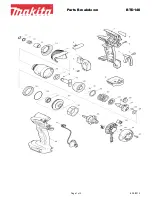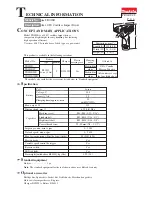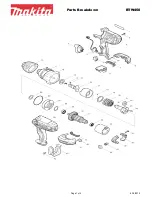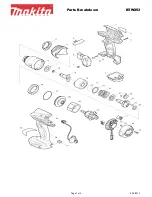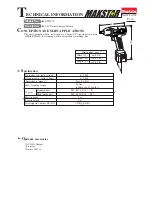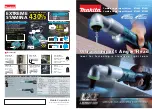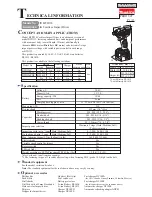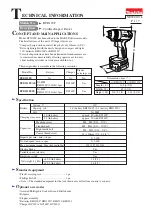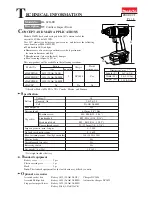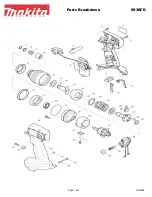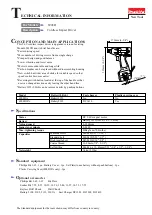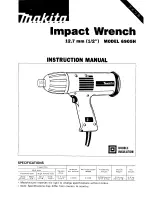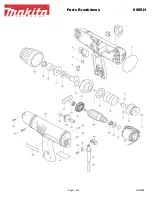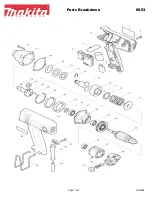
5
b. Do not use the power tool if the switch does not turn
it on and off.
Any power tool that cannot be controlled
with the switch is dangerous and must be repaired.
c. Disconnect the plug from the power source before
making any adjustments, changing accessories, or
storing power tools.
Such preventive safety measures
reduce the risk of starting the power tool accidentally.
d. Store idle power tools out of the reach of children
and do not allow persons unfamiliar with the power
tool or these instructions to operate the power tool.
Power tools are dangerous in the hands of untrained users.
e. Maintain power tools.
Check for misalignment or
binding of moving parts, breakage of parts and any other
condition that may affect the power tools operation. If
damaged, have the power tool repaired before use. Many
accidents are caused by poorly maintained power tools.
f. Keep cutting/scraping tools sharp and clean.
Properly
maintained cutting/scraping tools with sharp cutting edges
are less likely to bind and are easier to control.
g. Use the power tool, accessories and tool bits etc.,
in accordance with these instructions and in the
manner intended for the particular type of power
tool, taking into account the working conditions and
the work to be performed.
Use of the power tool for
operations different from those intended could result in a
hazardous situation.
5. Service
a. Have your power tool serviced by a qualified repair
person using only identical replacement parts.
This
will ensure that the safety of the power tool is maintained.
Additional safety rules for impact wrenches
This impact wrench kit is designed for removing and
installing nuts and bolts, and has been designed as a
general purpose tool kit for DIYers and hobbyists.
•
Disconnect the impact wrench from the power supply
before changing tools or accessories, servicing and
during non-operation.
•
Always wear safety glasses and using hearing
protection during operation. Exposure to noise may
cause hearing loss.
•
Do not wear loose fitting clothing and jewellery which
may become caught in moving parts and result in
serious injury.
•
Always use impact-quality sockets only. Do not use
handtool sockets, damaged or sockets.
•
Always ensure that sockets must be securely attached
prior to use.
•
Only use sockets that are in good condition.
•
Never trigger the tool when it has not been placed in
applied to a work object.
•
Sockets must be correctly attached.
•
Disconnect the power supply before installing sockets or
performing any maintenance.
•
Avoid body contact with grounded surfaces such as
pipes, radiators, ranges and refrigerators. There is an
increased risk of electric shock if your body is grounded.
•
Do not expose power tools to rain or wet conditions.
Water entering a power tool will increase the risk of
electric shock.
•
Avoid accidental starting. Check and make sure that the
switch is off before plugging in. When carrying the tool be
careful and pay attention to where you place your hand
and fingers as the switch can invite accidents.
•
Do not overreach. Keep proper footing and balance at all
times. Proper footing and balance enables better control
of the tool in unexpected situations.
•
Do not use on a ladder or unstable support. Stable
footing on a solid surface enables better control of the
tool in unexpected situations.
•
Keep the tool and its handle dry, clean and free from oil
and grease. Always use a clean cloth when cleaning.
Never use brake fluids, gasoline, petroleum based
products, or any strong solvents to clean your tool.
Following this rule will reduce the risk of loss of control
and deterioration of the enclosure plastic.













